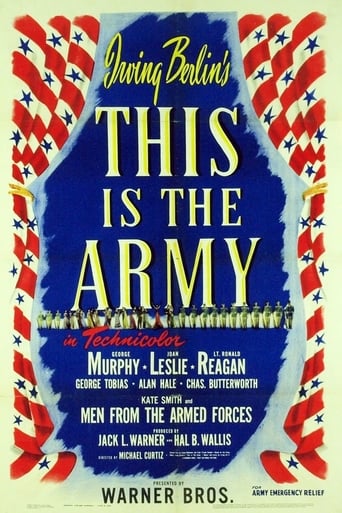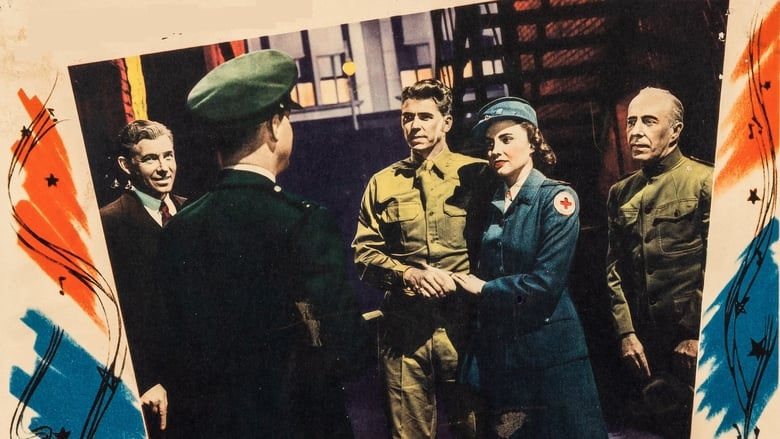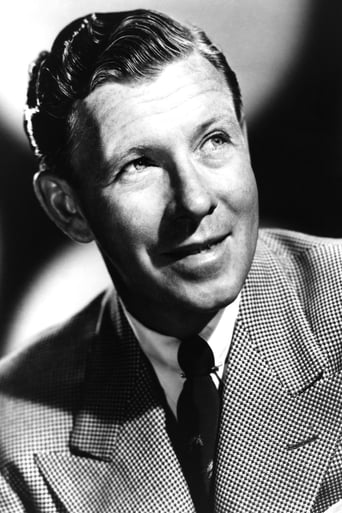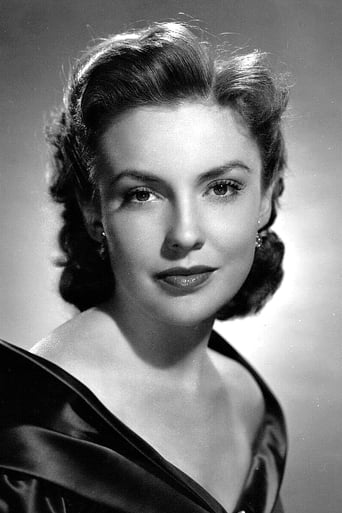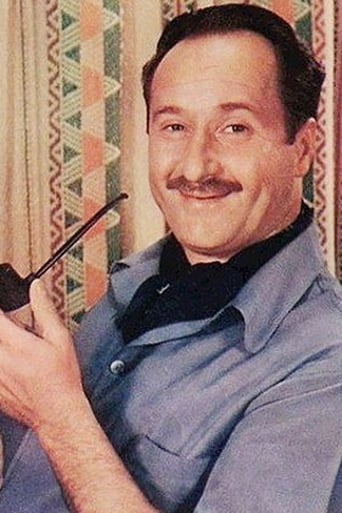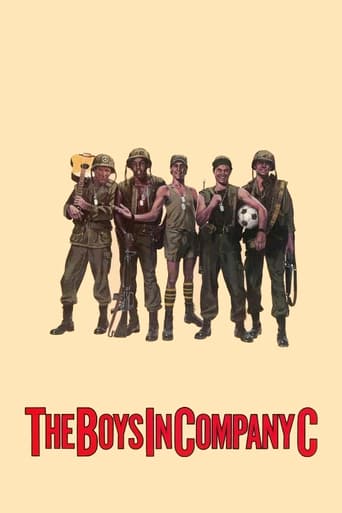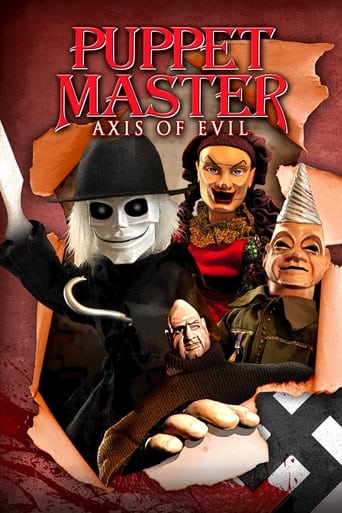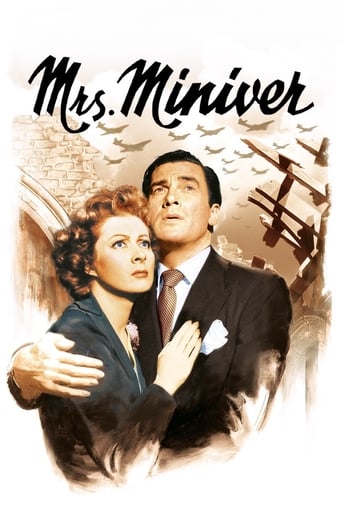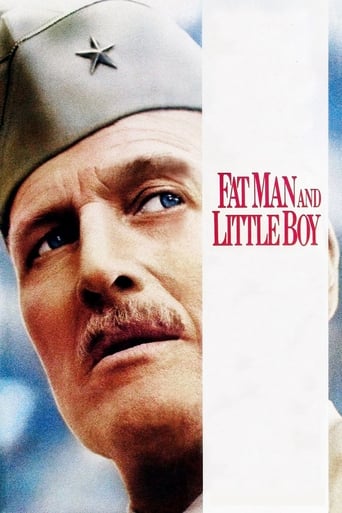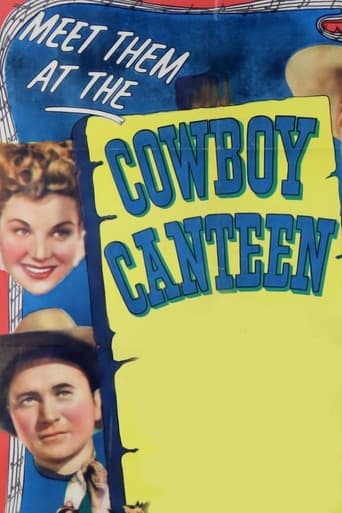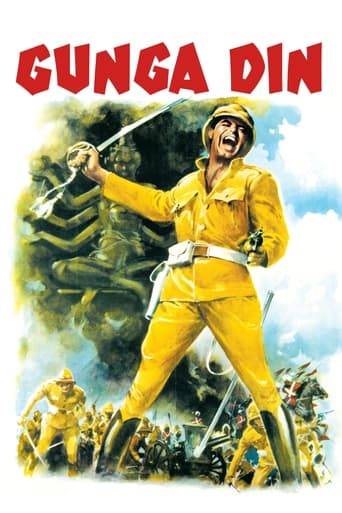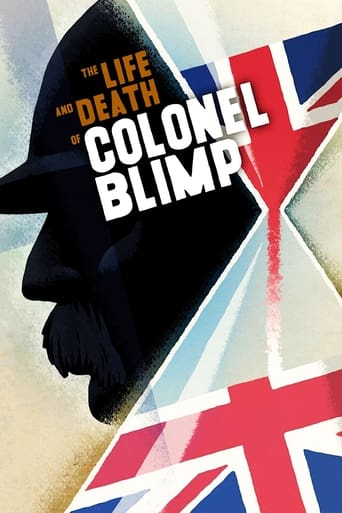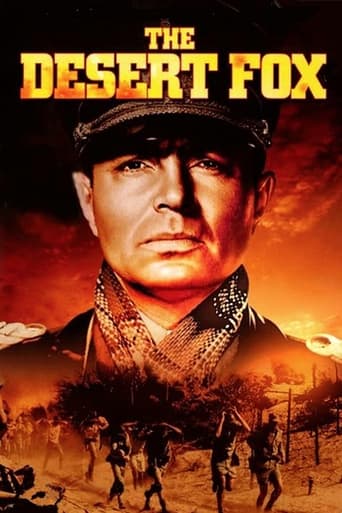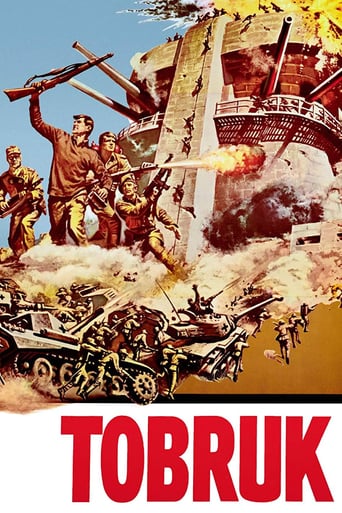This Is the Army (1943)
In WW I dancer Jerry Jones stages an all-soldier show on Broadway, called Yip Yip Yaphank. Wounded in the War, he becomes a producer. In WW II his son Johnny Jones, who was before his fathers assistant, gets the order to stage a knew all-soldier show, called THIS IS THE ARMY. But in his pesonal life he has problems, because he refuses to marry his fiancée until the war is over.
Watch Trailer
Cast
Similar titles
Reviews
Expected more
Excellent, Without a doubt!!
When a movie has you begging for it to end not even half way through it's pure crap. We've all seen this movie and this characters millions of times, nothing new in it. Don't waste your time.
The movie's not perfect, but it sticks the landing of its message. It was engaging - thrilling at times - and I personally thought it was a great time.
This World War 2 movie directed by Michael Curtiz of 1942's Casablanca fame, adapted from the 1942 Broadway musical by Irving Berlin was designed to boost war time morale in the U.S. Film was made for the Army Emergency Relief Fund and it made lots of money. The stage version had no plot, but this film is a lot better with a story, even if the story is very loose ended. The movie is mostly about Irving Berlin's time in both wars trying to pull all soldier show. Irving Berlin's story is being told by the character of Jerry Jones (George Murphy) who served his country during World War 1 by putting up a musical call 'Yip Yip Yaphank'. Like Berlin, he notice how successful, it was, with his enlistment son, Johnny (Ronald Reagan) try to use the show to gather up money. George Murphy was amazing in the role. You can't help feeling emotional when he reunited with his old war buddies to do the 'Yip Yip Yaphank' number again. Reagan looks fantastic in this film where he plays stage manager Johnny Jones. Its sucks that he can't sing, but at less, he can acted. Both pair of future California politicians were great. Irving Berlin even show up in the film. He composed most of the film's 19 songs, and broke screen protocol at the time by singing one of them. He performed, 'Oh! I hate getting up in the morning'. I have to say, while Berlin is one of the greatest song writers in the world, he isn't one of the best singers. The movie very mirrors, how the stage play went, even to the point, where the entire cast march off to 'We're on Our Way to France'. One song he didn't use was 'God bless America' which became a huge success later on, when singer Kate Smith sang the song on Armistice Day in 1938. Her performance in the film is probably one of the main highlights. Kate Smith is not the only personal celebrity to be in the film, as there are many others. One of the weirdest ones is boxer Joe Louis. Thank Goodness, he didn't sing at all, but honestly, he can't even act. I can't barely understand what he was saying. Besides because use for marketing to get Black Americans to see the show; he was pretty much useless. Honestly, I have a love/hate relationship with this movie when dealing with black characters. For good side, I'm glad, Berlin integration the army before the army did. Still, it was a bit 'mess up' to see soldiers in black face doing musical numbers. Then have Blacks dancers appear on stage simultaneously. I really can't love the "That's What the Well-Dressed Man in Harlem Will Wear" and 'Mandy' number, but it was well done. I know it came with the times where minstrel shows were popular, but gees "politically incorrect" right there. Also, I didn't like the dance number because it had little to do with the Army life. The whole Latin American dances seem out of place. I know US was trying to gain Latin America's countries support for the war effect at the time, but men in drags wasn't what Latin Americans wanted to see it. It was deem offending to them. Another scene that seem out of place is the whole celebrity spoof impersonation about hamburger. It's spoof Broadway stars, but it wasn't really funny. The comedy skit, after the first dance number was a little better. The whole Canteen scene was a bit odd. I had this whole vibe that it was supposedly a brothel due to the lyrics. Plus, they even had a madam type character in the play. I know, the burliest of the men in drag was used for laughs AKA "Ladies of the Chorus" number, but the whole scene in the Canteen had this homosexuality sexual orientation feel to it. I didn't mind it, but I thought women who served were under look in this movie. I know it has a all-male military-cast; but as have a Army Nurse Corp number. Frances Langford sings "What Does He Look Like" was great. Needed more of that. I love how the show is nearly hijack by the US Navy. I also love the Air Corps number, "American Eagles/With My Head in the Clouds". What an emotional number. Although the core of the movie consists of the musical numbers, the movie also contains a veneer of a plot involving the wartime love interests of both the father and the son. A sub-plot running the movie was Johnny telling his sweetheart that they cannot marry until he returns, since he doesn't want to make her a widow, but they find themselves going against their feelings. Glue together by this plot, this movie is 2 hours of great variety of entertainment, from show-stopping tap dance numbers, an acrobatic number, and even magic tricks. I love the comedy of the magic tricks. Overall, my favorite song is "This is the Army Mr. Jones". The only other song contemporary audiences might still recognize besides 'God Bless America'. "This Time We Will All Make Certain" was a great song for the ending. Some critics hate it for being propaganda. My answer to that is yes, it is propaganda and so what. It was better than what Europe was propaganda at the time. The film hasn't aged well, as it full of scratches and discoloring. At times, a few seconds of film seem to be either cut out of the film or just lost over time. The sound quality isn't that good as well. Some DVDs out there have a horrible quality so watch out. Since the movie is in the Public Domain, you can pretty much find it anywhere. A good quality is kinda rare. Though far from being great, this film has qualities that deserve the highest merit.
Although a dated period piece, this one is likely to win you over if you're a fan of patriotic old films. Music lovers will also find a lot to like here as well, with a whole host of tunes provided by the legendary Irving Berlin, who even manages to sing one of his creations - 'Oh How I Hate to Get Up in the Morning'. The picture book-ends it's story around two separate stage productions, starting with 'Yip, Yip, Yaphank' set in 1918, followed up by the 1943 'This is the Army' portion anchored by future President Ronald Reagan. There's a family connection introduced as well, as Reagan's character, Johnny Jones, is the son of Jerry Jones (George Murphy), the original star of the earlier production.If you're an old time movie fan, you'll recognize a host of players in the film like Joan Leslie, Alan Hale, and George Tobias, and virtually all of the secondary characters were in the service when they made the picture. Which was actually the point, the film was intended as a morale booster and positive propaganda for the American war effort. (I dislike using the term propaganda when it supports the U.S. cause, but I don't know if there's a better word to fit the bill).Undoubtedly, some modern day viewers will find offense with portions of the picture. The black-face Swanee River routine is regrettably embarrassing in hindsight, but then you have an incredibly well choreographed and athletic performance by real black singers and dancers which stands well on it's own. Similarly, soldiers performing in drag seems like it could have been avoided by using real service women in those numbers calling for it. But second guessing from the vantage point of almost seventy years is probably a futile exercise.I'd like to think there's a worthy message in the closing song number - "This Time is the Last Time" as it references America's prospects for future conflict. One more thing that the vantage point of 2010 is unlikely to make us feel secure about. One can only hope that courageous world leaders lead the planet to a safer place than the one we have today.
The musical "This Is The Army" qualifies as the most unusual war film that Warner Brothers produced. This Home Front musical stirred up controversy with scenes where active duty armed forces personnel cavorted in female apparel. Essentially, two Irvin Berlin stage plays, "Yip, Yip, Yaphank," a 1917 stage production, and Berlin's successful 1942 Broadway play "This Is The Army," served as the basis for the film. "Casablanca" scenarist Casey Robinson and veteran screenwriter Claude Binyon, an army captain now, added a back stage story about a young soldier's reluctance to marry his sweetheart before he marches off to war. The movie also spelled out its patriotic, gung-ho ideology in the last scene with the song "This Time Is The Last Time." The lyrics of this song suggested that there would not be a World War III. Warner Brothers assigned Casablanca director Michael Curtiz to "This Is The Army." Production on this Technicolor "A" picture got underway February 24, 1943 and ended May 14, 1943.The action unfolds in New York City in 1917 as dancer Jerry Jones (George Murphy) receives his draft notice. Jones marries his sweetheart Ethel (Rosemary DeCamp) and then reports for duty. At boot camp, Jerry struggles to make the transition from dancer to foot soldier. He makes his drill instructor, Sergeant McGee (Alan Hale, Sr.), painfully aware of his problem with regimentation. When Sergeant McGee talks about Jerry's problem to the camp commandant, Major John B. Davidson (Stanley Ridges), the commander decides that Jerry's talents may be put to better use on a morale boosting play. Jerry produces and stages "Yip, Yip, Yaphank," a show about Army life. As the show draws to a finish, the doughboys march off the stage in full fighting gear, down the aisles, and head for their transport ship. Jerry sees action somewhere in France, and comes home a cripple. He walks with a slight limp, but his handicap does not restrict him from his first lovethe stage. He opens a theatrical talent agency.The film leaps from 1918 to 1941, and Jerry's son, Johnny (Ronald Reagan), enlists in the Army to fight World War II. Johnny's sweetheart Eileen Dibble (Joan Leslie) wants to marry him before he leaves, but he refuses to exchange vows. Meanwhile, Jerry gets together with Major Davidson, and they arrange for Jerry to produce another morale boosting musical. Reluctantly, Johnny helps out his father. Unlike "Yip, Yip, Yaphank," the new show incorporates African-Americans in the cast, most prominently boxing champion Sergeant Joe Louis (the actual Joe Lewis), and features an all black musical number "That's What The Well-Dressed Man in Harlem" will weararmy khakis. As the soldiers are about to perform their final number, Ethel persuades Johnny to marry her. In the closing number, Johnny and the troops march off to World War II singing "This Time Is The Last Time." No sooner had Warner Brothers prepared to go into production on "This Is The Army" than an issue arose involving overseas distribution and the Office of Censorship. Warner sent a memo to Hal Wallis about the matter dated December 28, 1942, that Allison Durland, an unofficial adviser to the OOC who handled Latin American affairs for the PCA, said, "regardless of extenuating circumstances he does not believe export license would be granted because of female impersonators." As Warner Brothers would learn to their surprise, Central and Latin American countries considered men dressing up as women as repugnant and immoral. That American soldiers would be impersonating females did not go over well either.Although Warner Brothers released This Is The Army to domestic theaters on August 14, 1943, the studio had to confront the unexpected crisis over female impersonators, a predicament unique to this movie, because they produced no other films during the war that created so much controversy over something that everybody involved in deemed more amusing than offensive. Warner Brothers foreign distribution executive Carl Schaefer sent a memo to Warner on December 17, 1943, after he had conferred with Rothacker. Schaefer told Warner that he had "been advised unofficially we will be denied export license for This Is The Army if men play chorus girls as in the stage production." At length, Schaefer explained the rationale to Warner, "Female impersonators do not exist in Latin America: men in women's clothing are highly insulting and revolting to Latin American sensibilities and censors. Even could the film be exported, United States soldiers cavorting in dresses would represent ammunition to the enemy's propagandists. The Universal Pictures film "Argentina Nights" (1940) proved this point."This Is The Army" is a blast to watch.
First of all, had you done your research, you would've known that all three branches of the military had (and still have) entertainment divisions whose sole job is to produce shows for the troops. If you looked at the "Crazy Credits" section you would've learned that famed composer Irving Berlin staged the two soldier shows as depicted in the movie.Yes, many of the skits and songs are terribly dated and yes "This is the Army" is largely a propaganda film, but Berlin singing his "Oh How I Hate to Get Up in the Morning" was the lament of every draftee.Virtually *every* film made during WWII was done either as propaganda or to bolster the spirits on the homefront.I respectfully suggest watching it again, but instead of looking at it with 2004 cynicism, look at it in the context of the times.
